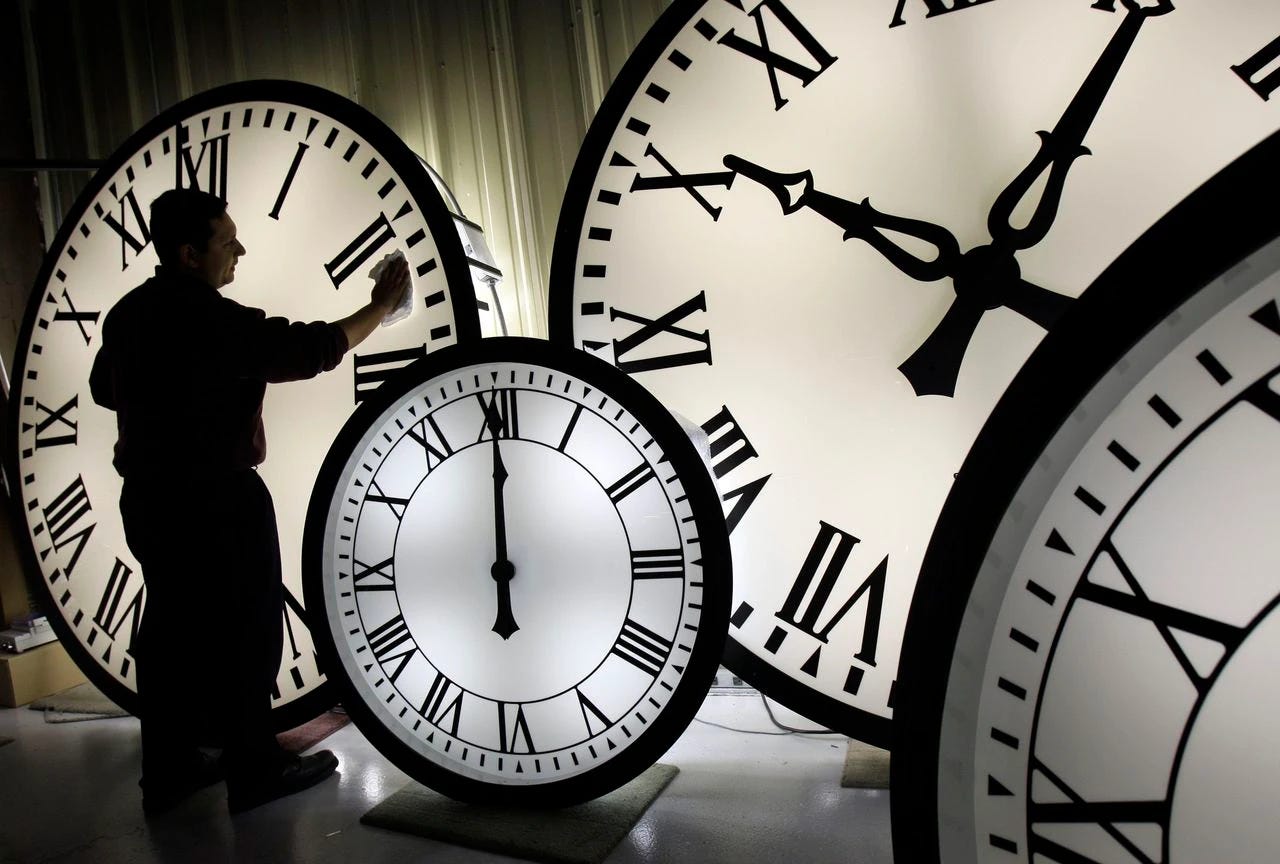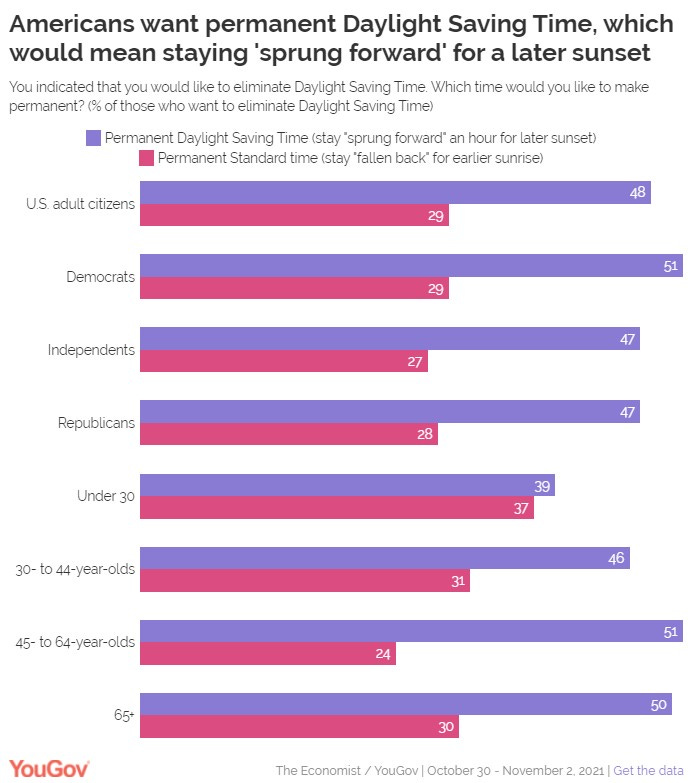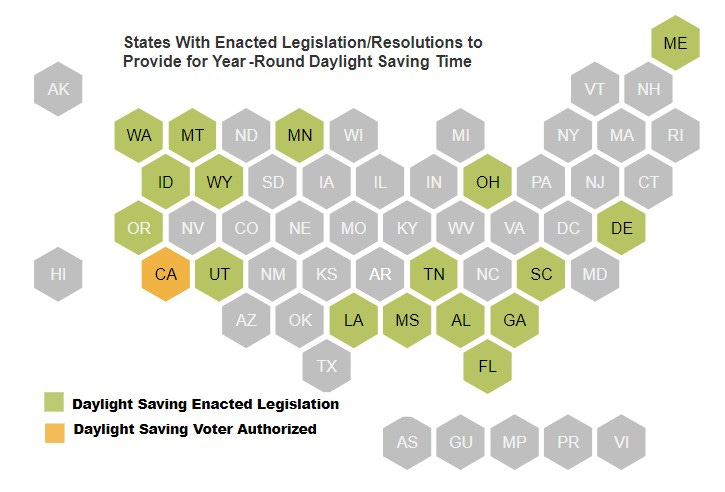Ricochet is the best place on the internet to discuss the issues of the day, either through commenting on posts or writing your own for our active and dynamic community in a fully moderated environment. In addition, the Ricochet Audio Network offers over 50 original podcasts with new episodes released every day.
 Daylight or Standard Time: Pick One, Congress
Daylight or Standard Time: Pick One, Congress
It’s time for our biannual ritual – moving the clocks forward this time – effective at 2 a.m. on Sunday, March 13th. It was just four months ago that we drove them back. And with it, of course, will come our equally ritualistic grumbling or celebrations, depending on whose side you fall on this centuries-old debate unless you live in most of Arizona, Hawaii, Puerto Rico, the Virgin Islands, Guam, or American Samoa. Under the Uniform Time Act, those jurisdictions have exempted themselves from Daylight Savings Time. Our trusty US Department of Transportation regulates the process.

It isn’t much of a debate anymore. According to an Economist/YouGov poll from last November, by an almost 2:1 margin, most Americans want 1) to end the practice of clock-changing and 2) prefer to permanently “spring forward” than “fall back.” That’s a change from just two years ago, which an Associated Press poll had Americans split three ways: about 40 percent in favor of standard time; 30 percent for daylight savings; and another 30 percent who love changing their clocks twice a year (who ARE those people?).

“At least some of Americans’ stated preference to eliminate changing times may stem from the inconvenience and abruptness of the transition between times, which they could feel more strongly when asked about it near clock-changing times,” YouGov said. Many Americans say they dread the forthcoming transition from Daylight Saving Time. Asked about its end this Saturday, 34% of Americans say that they are not looking forward to it, 21% say they are looking forward to it, and 38% say they don’t really care.”
The US House Subcommittee on Consumer Protection has the umpteenth hearing at 9:30 a.m. Wednesday (EST), “Changing Times: Revisiting ‘Spring Forward’ and ‘Fall Back.’” They’re featuring a law professor, an expert in sleep neurology and pediatrics, and a lobbyist for the National Association of Convenience Stores.
All three will tell us things we already know.
The law professor will likely walk through the various times Congress has messed with our clocks, most often as war-time measures, such as World War I and enactment of the Calder Act. They instituted year-round DST in 1942, during World War II – “War Time” – and again during the 1973 energy crisis. Most recently, in 2005, Congress changed the calendar when DST is in effect (the second Sunday in March until the first Sunday in November – eight months.
And most states aren’t waiting for Congress to act, although it is Congress that ultimately must institute a national change. According to the National Conference of State Legislatures:
State legislatures continue to grapple with the vexing and multifaceted state policy questions regarding the biannual changing of the clocks. Most all of the states have considered legislation over the last several years that would place the state permanently on either standard time or daylight saving time. Since 2015, at least 350 bills and resolutions have been introduced in virtually every state, but none of significance passed until 2018, when Florida became the first state to enact legislation to permanently observe DST, pending amendment of federal law to permit such action.
In the last four years, 18 states have enacted legislation or passed resolutions to provide for year-round daylight saving time, if Congress were to allow such a change, and in some cases, if surrounding states enact the same legislation. Because federal law does not currently allow full-time DST, Congress would have to act before states could adopt changes.
The 18 states are Alabama, Georgia, Minnesota, Mississippi and Montana (2021). Idaho, Louisiana, Ohio (resolution), South Carolina, Utah and Wyoming (2020). Delaware, Maine, Oregon, Tennessee and Washington (2019). Florida (2018; California voters also authorized such a change that year, but legislative action is pending). Some states have commissioned studies on the topic including Massachusetts (2017) and Maine (2021).

Arizonans I know love not changing their clocks but are mildly annoyed at changing schedules for east coast or California phone calls, Zoom meetings, and travel.
Second, changing clocks is not good for our health. “Studies have found an increase in car accidents during the week following the change to daylight saving time and an increase in patient-safety related incidents associated with human error in the week following the transition into and out of daylight saving time,” according to the American Academy of Sleep Medicine. Other adverse effects of the time change in the spring include increased risk of stroke and hospital admissions, and increased production of inflammatory markers, one of the body’s responses to stress.”
The AASM opposes Daylight Savings Time: “Conversely, another study found that in the fall, during the shift from daylight saving time back to standard time, there was a reduction in the rate of cardiovascular events, suggesting that the risk of heart attack may be elevated because of chronic effects of daylight saving time.”
It used to be worse in Indiana, where some counties in Chicago’s Central Time Zone orbit eschewed Daylight Savings Time while the rest of the state stuck with DST. For example, if you lived in LaPorte County – no DST at the time – one had to wake up at 4 a.m. for a one-hour drive for 7 a.m. breakfast in Elkhart, Indiana, which observed DST. Ugh. Indiana fixed that disparity by a single vote, so the entire state now observes DST.
But my least favorite day of the year when I was employed full time was the first workday after turning the clocks back in November. It was a depressing reminder of winter months ahead, and I hated driving home in the dark.
Third, changing clocks disrupt our economy in a variety of ways. Dairy farmers will be quick to tell you that cows don’t change their clocks. Some parents of young school-age children who catch buses to school will lament waiting in the early morning darkness. Others will cite energy savings, but various studies have produced mixed results.
But in his testimony on Wednesday, Lyle Beckwith of the National Association of Convenience Stores will testify in support of permanent DST. From his written testimony that is already public:
Our industry has consistently found that commerce increases when the nation moves to daylight saving time. When the clocks change in the spring, people feel as though they have more time after work to engage in a range of activities that increase commerce from eating out to shopping to participating, in or taking kids to, a variety of outdoor activities. The increases in economic activity that result can be dramatic. They consistently show increased spending when daylight hours are shifted later in the day through daylight saving. One study compared spending changes when daylight saving started and stopped in Los Angeles with spending in Phoenix, which does not observe daylight saving time. The result was clear increases in spending in Los Angeles when daylight saving started and losses of spending when it ended.2
The golf industry is one specific example. That industry estimated as early as the 1980s that an additional month of daylight saving time would mean hundreds of millions of dollars in revenue to the industry.3 For the convenience industry specifically, 76.5% of sales come during the part of the year when we are on daylight saving time. That is a significantly higher percentage than the 65% of the year we spend using daylight saving time. Overall, this means about $5 billion of incremental sales for the industry attributable to the change to daylight saving time. Those are big numbers – particularly in an industry dominated by small businesses that operate with tight profit margins.
Lastly, and sadly, Congress will probably do nothing in the short term. It’s an election year, and there are bigger fish to fry.
But we’d all benefit if Congress would pick one – either Daylight or Standard Time – and make it uniform across the nation. As for me, I’m on Team Daylight Savings Time. I might even take up golf again.
Published in General



I don’t care what time the sun comes up or goes down. I didn’t care when I worked a day job, I don’t care now that I work a night job. I just don’t want to change the clocks twice a year.
Lucky for you, most clocks change themselves these days.
Ha, ha, that was a problem for us for years. About 17-18 years ago we bought clocks that automatically changed. Well, living in AZ we had to change the time zone when DST occurred since our time didn’t change. So then they changed the dates for DST and our clocks were not programmed for that. So most of the time I forgot about that and our clocks would change automatically at the old date and we would be totally confused about the time on that Sunday morning. I know, duh, buy new clocks. But other than that they were perfectly good clocks.
Heck, I’m still using the alarm clock/radio that I had in high school. It works. I like the color. Why buy a new one?
Here’s what I wanna know. Why do we all assume that the government has the authority to tell us what time it is? The twice-annual clock change is not some kind of mandate that we are required to obey. If there really is a majority of people who want to stay on Daylight Saving Time year-round, there is absolutely nothing stopping them from doing so.
The catch, of course, is that we all have to change together if we are to avoid chaos. And the government does have the authority to decide what time the government will use. So we kinda end up having to follow their lead.
But really, changing the clocks is like a mask mandate from the CDC: it’s “guidance” that we didn’t have to follow in the first place. I have to wonder: if everybody else decided to stop changing their clocks, and government agencies were the only ones still doing it, how long would it take before they realized they had no choice to join the majority? They’d be the ones out of step.
It just bugs me that so many people assume, without even questioning it, that the government can tell us we have to change our clocks, and we have to comply. We don’t. We choose to, but only because everyone else chooses to.
I have a friend who doesn’t. I’m not sure if he stays on standard time or daylight savings, but he doesn’t ever change his clocks.
Second Amendment Folks say that the government can take their guns only when they are pried from their “cold” dead fingers.
In Arizona, we would say that you can force Daylight Savings Time on us, only when you pry our clocks from our “sweaty, hot, dead hands.” Not going to happen.
Good question, but it would depend on how Congress writes any new law. It would be hard to imagine them letting states opt out of year-round daylight savings. The less confusion, the better. I suspect Arizona would adjust fine either way after the initial and permanent change.
Oh great. Just what we need in the summer. Another hour of daylight.
“You’ll get used to it” is exactly what the leftists say when they demand we use CFLs or low-flow toilets.
Actually, Arizona might join the Pacific Time Zone. In Phoenix in summer, we can’t wait until the sun goes down. Finally, we are delivered from the cursed daylight.
I love many places I have been in Arizona. I always go around Phoenix to get to them.